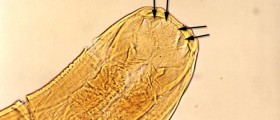
Hookworms
Infestation with hookworms is typical in tropical and subtropical areas. Larvae of this parasite can be easily killed by high temperature and wet soil of previously mentioned regions is rather suitable for their existence. If there are not enough parasites in gastrointestinal tract the disease may be asymptomatic. However, if the number of hookworms is greater the patient will evidently suffer from some symptoms and signs of the disease.
The infestation with hookworms goes through two stages. In the first stage the larvae of the parasite are migrating and growing. They eventually mature and become grown up worms ready to multiply. The second stage is actually a chronic infection. In this stage the hookworms are completely mature.
Infection and Symptoms of Hookworm Infection
Hookworm larvae enter the human body through skin. The place of parasite entrance may be itchy and covered with rash. If this spot is scratched the skin may get infected and this leads to additional problems. After penetrating the skin larvae enter the bloodstream and spread to the lungs.
It is no wonder that the very presence of larvae in the lungs causes certain symptoms. They are in most cases mild and include cough and wheezing, but small number of patients may develop serious pneumonia. Respiratory symptoms tend to linger until the worms leave the lungs.
Finally, hookworms reach small intestines, their natural habitat. Larvae attach to the mucous membrane of small intestines and steal nutrients, vitamins and minerals from the host. The moment the worms have reached small intestines the symptoms of the infestation start to develop. The most common symptom is abdominal pain, nausea and vomiting. Diarrhea, loss of appetite and flatulence may occur as well. Cramps together with intestinal colic may be evident if there are too many hookworms in the intestines. Heavy infestation can result with black coloration of the stool or traces of blood in the stool. Sometimes a patient may even notice eggs of the parasite in the stool. However, the eggs in the stool occur only several months after the infestation.
If the diagnosis has not been set on time, prolonged exposure to this parasite can additionally result in anemia. Anemia is a consequence of inappropriate absorption of iron. Anemic patients are tired and pale. Anemia most commonly affects patients with plenty of parasites in gastrointestinal tract.
If a doctor assumes that a patient is infected with hookworms he/ she will take samples of stool. The presence of the parasite eggs will be suitable conformation of the infection.






_f_280x120.jpg)










Your thoughts on this
Loading...